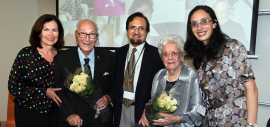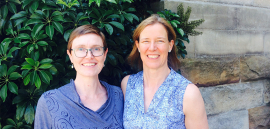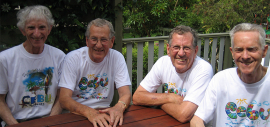Blog: The Brain Dialogues, filtered by tag: Longitudinal studies
Josie Bigland | Meet Our Researcher Series
Josie Bigland is working toward becoming a Clinical Psychologist, with a personal goal of giving back to the community; specifically, families enduring hardship when it comes to managing the health of a loved one affected by dementia. Her experience with quality control of data across CHeBA’s longitudinal studies has revealed to her the importance of exercising throughout the lifespan to maintain cognitive health.
How did you first get into researching the ageing brain?
As a self-supporting student, I was looking for a research assistant position to get me through university whilst… Read More
Subjective Cognitive Complaints and Dementia
HEIDI DOUGLASS | h.douglass@unsw.edu.au
Study Co-Ordinator of CHeBA’s Sydney Memory & Ageing Study, Dr Katya Numbers, was invited to present on participants’ subjective experience of cognitive decline at the 4th Annual Australia Dementia Forum 2019 Conference (ADF) in Hobart in June.
The Sydney Memory and Ageing Study began in 2005 to examine clinical characteristics and prevalence of mild cognitive impairment and to determine the rate of change of cognitive function over time. Since its inception, the study has included over 1,000 older adult Sydney residents making it one of the… Read More
Does Social Interaction Reduce Risk of Dementia?
DR ANNE-NICOLE CASEY
How people interact with and perceive one another, and each person’s thoughts and feelings about the quality of those interactions and relationships, can affect physical and mental health and well-being. Social cognitive function, which broadly refers to the way our brain processes social information, is recognised as an important marker of how efficiently our brain processes information in general1. Interestingly, the number of individuals with whom a person interacts frequently is associated with their short-term memory capacity2. Some studies report that having larger… Read More
Findings from the Older Australian Twins Study
HEIDI DOUGLASS | h.douglass@unsw.edu.au
Established by CHeBA staff in 2007, the Older Australian Twin Study (OATS) is the largest and longest running Australian research study of its kind investigating healthy brain ageing. By studying older twins (aged 65+ years) over time, OATS allows researchers to investigate the complex interactions between multiple genetic and environmental factors which cause brain diseases. Over the last decade, OATS has generated over 32 published papers and contributed to 8 international consortia, providing valuable insights into healthy brain ageing and age-… Read More
Exploiting Big Data for Dementia Research
PROFESSOR PERMINDER SACHDEV
This article was first published in InformAge, Volume 2, Issue IV December 2015 (Summer).
Dementia is a global problem, and there is a worldwide effort to identify risk and protective factors, determine early biomarkers, and develop novel treatments for dementia. A survey of the international research scene reveals that many groups are working in relative isolation on projects that are similar to research conducted elsewhere. Very often, the individual projects are not large enough to provide conclusive answers to complex research questions. A recent… Read More
Doubling the Data Through Twins Research
KATE CROSBIE and HEIDI DOUGLASS | h.douglass@unsw.edu.au
For John Stapleton, the best thing about being a twin was never being bullied at school: “There were always two of us to fight”. For Terry Stapleton, it’s the “stronger bond” between twins; that, and meeting John for a beer most Fridays at The Oaks in Neutral Bay. Both twins maintain a physically and mentally active life, but in different ways. These differences, as well as their similarities, are helping CHeBA researchers understand the role of genetic and environmental factors in cognition and healthy ageing.
John and Terry… Read More
Living to 100

DR CHARLENE LEVITAN
Centenarians are the fastest growing age worldwide. We can learn about ageing by studying the extremes, especially those who are models of "successful ageing". So how do we live to 100 in good physical and mental health?
Approximately 30% of longevity is contributed to be our genes. Parents of centenarians live an average age of 10 years longer than the average life expectancy of the population. Centenarians are four times more likely to have a sibling in their early nineties.
The remaining 70% of ingredients relate to the our life style. Montefiore participants in the… Read More
Donating Your Brain to Research
HEIDI DOUGLASS | h.douglass@unsw.edu.au
There are currently approximately 320,000 people in Australia with dementia, with that number set to rise to almost one million by 2050, and 115 million globally. These predictions mean that not only do we need a clear plan to make care available for so many people with dementia, but we also need to pursue prevention strategies vigorously.
Prevention of dementia depends largely upon research, and beyond the necessities of funding, equipment, and academics with the right skill base to perform the research we need one extra thing: brains.
"Even before… Read More







